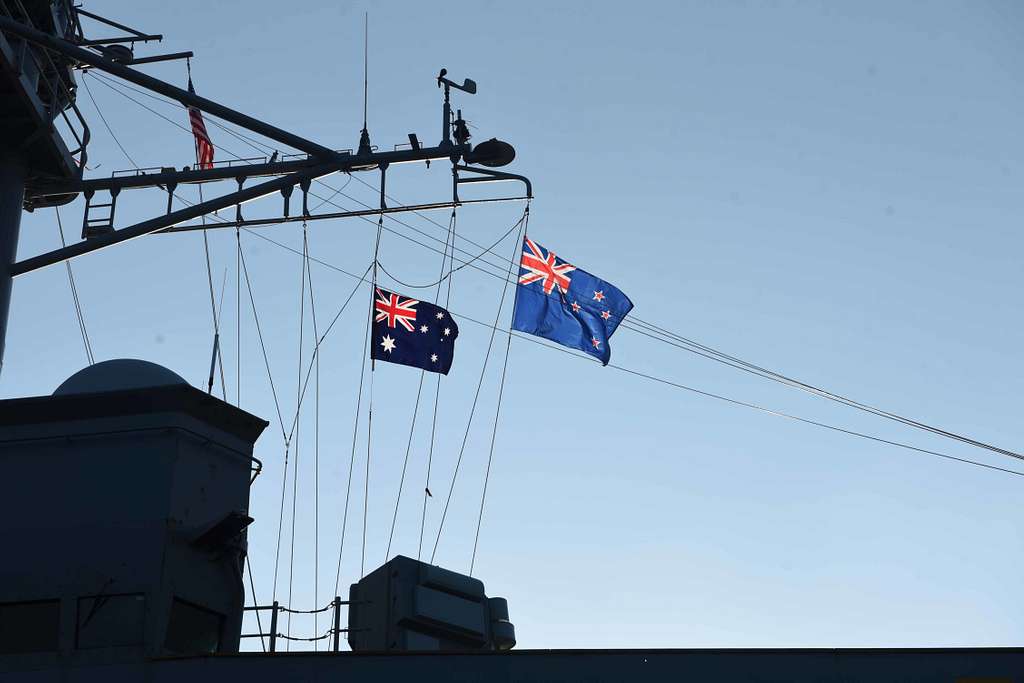The AUKUS security pact between Australia, the United States, and the United Kingdom is uniquely both vulnerable to Chinese disruption to critical mineral supply chains and capable of countering this coercive threat. AUKUS provides an expedient framework for shoring up supply chain security—and Australia can play a key exporting role—but greater urgency is required.
The recent US decision to review the AUKUS security pact in line with the Trump administration’s “America First” agenda has shaken its Australian and British partners. But the issue of critical minerals (CMs) and countering Chinese supply chain coercion remains core to the Trump agenda. And on CMs the AUKUS partners have a shared strategic interest, as well as the bilateral and multilateral structures that provide the basis for greater cooperation.
US concerns centre on the pact’s first pillar, particularly the sale of Virginia-class submarines to Australia being sought by the Royal Australian Navy to fill its looming capabilities gap prior to the delivery of AUKUS-class SSNs from the 2040s. With a range of challenges leading to delays in production, analysis suggests that the annual output of Virginia-class submarines would have to nearly double to meet both US and AUKUS requirements.
But AUKUS’ second pillar, focused on development of advanced military capabilities, is arguably just as significant. These technologies—from quantum to hypersonics—may come to define the future of war. Yet the supply chains of CMs that underpin these capabilities are dominated by Beijing. According to the latest figures from the International Energy Agency (IEA), China supplies 77 percent of the world’s cobalt, 70 percent of processed lithium, 31 percent of nickel, and 91 percent of refined rare earth elements (REEs). Close cooperation on CM supply chains by the AUKUS partners will be needed to secure these supply chains for Pillar II technologies.
A shared interest in securing supply chains
The risks of technology development within AUKUS suffering supply chain disruption have become ever more apparent as China weaponises its near monopoly over CMs. In April, Beijing restricted global exports of seven REEs, leading to shortages in factories across the US and Europe. The move, which also included export curbs on permanent magnets and other finished products, was widely seen as a response to Trump’s “Liberation Day” tariffs. Months earlier, in December 2024, China had banned the exports to the US of gallium and germanium, elements crucial to cutting-edge microprocessors. Such coercive actions underscore Beijing’s ability to flex its economic muscle in the mining and processing of core materials that are intrinsic to most advanced technologies—and difficult to replace.
The Trump administration recognises the security imperative of ensuring a sustainable supply of critical minerals. In the short period since returning to power, Trump has issued a flurry of executive orders aimed at supercharging domestic CM production—slashing red tape and accelerating mining approvals.
Although there is clear bipartisan focus on CMs, Trump’s approach differs from that of his predecessor Joe Biden in two key respects. Firstly, Trump rejects the climate-driven CM subsidies of Biden’s Inflation Reduction Act (IRA) and is seeking to scrap or curtail swathes of the IRA in his flagship “One Big, Beautiful Bill Act.” Secondly, the emphasis has shifted from Biden’s friendshoring approach (through multilateral vehicles like the Minerals Security Partnership) to onshoring and a more transactional relationship with allies, most obviously with tariffs and the Ukraine minerals deal.
Pillar II technologies are vulnerable to supply chain coercion, but AUKUS is also uniquely capable of countering such a threat. The pact has been central to US-led initiatives to contain Beijing’s military rise in the Indo-Pacific and is therefore a prime target for coercion. But it also provides an expedient framework for securing supply chains.
US reserves are substantial but insufficient for self-reliance across all CMs. Yet Washington has access to significant private and public capital to invest in projects overseas. Given Trump’s transactional approach to international relations, the UK and especially Australia may be able to leverage their respective value in CM supply chains, particularly as they relate to US defence needs (rather than the green transition). This may also ensure a greater commitment by Washington to AUKUS. Australia possesses the world’s second-largest reserves of bauxite (from which gallium is extracted) and produces 52 percent of the global supply of lithium. UK reserves are more modest, but the country boasts deep engineering and mining expertise while the London Stock Exchange is home to major industry players, including Glencore, Anglo American, and Rio Tinto.
Frameworks for critical mineral cooperation
Since AUKUS was launched in September 2021, the partners have developed a raft of legislative and diplomatic agreements to operationalise the pact. The following agreements serve as a framework for cooperation specifically on CMs:
- The Climate, Critical Minerals, and Clean Energy Transformation Compact, signed in 2023, established clean energy and climate as a “central pillar” of Australia-US relations. The Compact established a joint Taskforce on Critical Minerals to engage both bilaterally and acknowledged the importance of CMs’ defence applications.
- In April 2023, Australia and the UK signed a joint Statement of Intent on CM collaboration for greater investment policy coordination, data sharing, R&D collaboration, and skills exchange. In November 2024, on the sidelines of COP29, London and Canberra announced the Australia-UK Climate and Clean Energy Partnership, enhancing bilateral cooperation, including over opportunities on “green metals.”
- Similarly, the UK-US Atlantic Declaration provides for cooperation on a range of AUKUS-relevant issues, including a Joint Energy Supply Chain Action Plan. The Declaration also launched negotiations for a US-UK Critical Minerals Agreement.
- The AUKUS partners are all members of the Minerals Security Partnership, which in September 2024 established a new finance network among export and development agencies. Already in March 2024, the MSP had facilitated the issuing of a non-binding Letter of Interest by the US EXIM Bank in financing of up to US$600m for the Dubbo REE project in New South Wales.
- Australia and the UK have also been designated as “domestic sources” under the US Defense Production Act, under which a range of financial incentives—including loans and loan guarantees, purchase commitments, equipment purchases, and direct subsidies—can be leveraged to secure supply of defence-relevant materials.
An opportunity for enhanced collaboration
The structures for greater collaboration on CMs are in place; the political will on supply chains is only stiffening in the face of greater Chinese coercion. Yet concrete outcomes thus far remain elusive. As with so many globalised industries, this is a volatile time for CM production. The Liberation Day tariffs and the proposed gutting of IRA subsidies under the One Big, Beautiful Bill Act come after a difficult period of falling prices for many key CMs that had led to a string of Australian mines suspending operations.
Meanwhile, Beijing’s restrictions on REE exports have provided yet another shock, alerting manufacturers to the risks of overdependence on Chinese imports. Australia is well-placed to step in. ASX-listed Lynas Rare Earths is the largest producer of REEs outside of China and opened Australia’s first REE processing plant in November. REE projects from Northern Minerals, Arafura Rare Earths, and Iluka Resources are also in the works.
Notwithstanding such progress in REEs, broader efforts to expand domestic refinement of CMs have faltered. At present, much of the CM material extracted in Australia is sent to China for processing—a weak link in the security of supply chains that renders the product ineligible for US consumption under IRA subsidies. Notably, planned expansions of lithium processing plants in Kwinana and Kemerton have been shelved following technical setbacks and falls in lithium prices.
There is much work to be done in securing CM supply chains in the face of China’s dominance. The Trump administration recognises this challenge; AUKUS may yet provide the solution. AUKUS’ Pillar II technologies remain vulnerable to supply chain coercion, but the mineral reserves are there, the structures of cooperation in place—delivery is the next step.
Ansel Bayly is a Research Assistant in the Centre for Science and Security Studies in the Department of War Studies at King’s College London. He studied for a BA in Liberal Arts, majoring in Politics at King’s from 2022 to 2025. His research interests include critical minerals policy, supply chain weaponisation, and US-China strategic competition.
Sarah Tzinieris is a Lecturer in Security Studies Education in the Centre for Science and Security Studies in the Department of War Studies at King’s College London. She holds a MPhil and PhD in International Relations from the University of Cambridge. Sarah has broad-ranging research interests but currently her work is focusing on US-China relations, AUKUS, critical minerals, technology racing, and emerging challenges to world order, particularly in terms of how great powers employ coercive strategies in an era of strategic competition.
This article is published under a Creative Commons License and may be republished with attribution.





